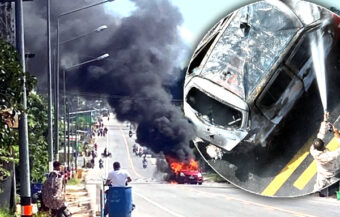Baht is predicted to fall due to tightening monetary policy in the United States to ward off inflation. A key economic forecasting unit in Bangkok is only predicting 4 to 5 million foreign tourists in 2022 with a sparse 350,000 visitors for this year. The week saw positive news for the automotive sector with a massive investment by Ford and news of a surge in IT expenditure as the wider economy in Thailand shifts online.
The Bank of Thailand governor warned on Wednesday that it will be the first quarter of 2023 before the Thai economy returns to pre-pandemic levels and predicted a growth rate next year at between 2.8% and 3.5% because of the damage inflicted on the country’s foreign tourism sector. It comes in a week when Thailand’s automotive sector was boosted by the announcement of a $900 million investment by Ford and a projected record expenditure in the IT sector in 2021 following a surprisingly successful year. On Friday, a spokesman for the prime minister told reporters that General Prayut was pleased with the country’s ongoing economic recovery led by the wider reopening of the country to foreign tourists since November 1st and suggested that GDP growth could reach as much as 4.5% in 2022.

On Friday, a spokesman for the Prime Minister’s Office spoke of the PM’s satisfaction with the country’s economic recovery since October although with continuing uncertainty over the possible impact of the Omicron virus strain.
It comes in a week when the Ford Motor Company, in what is seen as a vote of confidence by American industry in Thailand and its automotive sector, announced plans to invest $900 million in the kingdom in association with its Auto Alliance venture with the Japanese motor company Mazda.
Rise in confidence according to Federation of Thai Industries index for three months in a row recorded
Mr Thanakorn Wangboonkongchana of the Prime Minister’s Office, on Friday, pointed to a rise in confidence according to the latest Federation of Thai Industries index survey which rose from October to November to 85.4 from 82.1.
It was the third consecutive rise in a row and has been attributed to the relative success of the country’s reopening since November 1st even though the numbers are considerably lower than expectations. This followed a boost from October 11th when the initiative was announced by the prime minister.
The process has seen nearly the entire economy, except for the nightlife and entertainment industry, being reopened with many restrictions lifted and curfews rescinded nationwide.
Resurgence in Thai exports to world markets to continue into 2022 with a growth rate of 5 to 8%
This, said Mr Thanathorn, has been accompanied by a resurgence in export demand as Thailand’s export markets also picked up with growing output to the United States, China, ASEAN and India.
He predicted that the kingdom could see a GDP increase of up to 4.5% in 2022 although this is ahead of market expectations at this time.
He pointed to bullish forecasts by the Thai National Shippers’ Council which has said it expects exports to grow by between 5% and 8% next year.
Announcement of $900 million investment by Ford is a vote of confidence in Thailand’s automotive sector
The announcement by Ford on Wednesday is particularly positive for Thailand as the government seeks to endorse the country’s credentials as a base for new electric vehicle technology.
The $900 million investment is linked to the popular Ford Ranger pickup and Everest SUV. Both models have EV versions which have been developed using Ford’s own technology.
Car assembly and production currently accounts for 10% of all employment in the country’s manufacturing and export sector which was hit severely at the end of the summer by supply chain issues.
The new investment by Ford will see $400 million of the overall investment injected into its supply chain network.
US auto giant GM is pulling out of Thailand to focus on more profitable markets. 1,500 jobs lost for now
Warning signal from Nissan as it tells agents it is halting production of key car models in Thailand immediately
The industry faced question marks in 2020 when General Motors announced its withdrawal from Thailand and Honda signalled it was reviewing its operations in the kingdom.
Government’s 2019 electric vehicles vision is paying off with stronger investment into the growth sector
The determination of the government to make Thailand a hub for electric vehicles does however appear to be paying off.
The General Motors plants were purchased by Chinese automaker Great Wall Motor Co. which has already commenced production of its own branded SUVs and electric vehicles.
The country’s own indigenous research and development and indeed the production of electric vehicles is also paying off with a range of Thai firms such as Bangkok-based Energy Absolute, a biodiesel vehicle manufacturer which has moved into EV vehicles, also making strides with consistent profitability.
Thailand faces an economic test as change becomes a reality in cars, farming and business
It’s all part of a government initiative pushed from 2019 for Thai firms to be capable of producing 1 million EV classified vehicles per annum including hybrids by 2025.
Then there is the state-owned and Stock Exchange of Thailand (SET) listed PTT Public Company Limited which announced this year that it is investing $1 to $2 billion in a joint venture with the huge Taiwanese multinational electronic manufacturer Foxconn.
In May this year, the two firms signed a Memorandum of Understanding to build electric vehicles in Thailand and key components for the sector.
The deal was highlighted as a key part of Thailand’s new goal of producing 725,000 zero-emission passenger cars by 2030.
Bank of Thailand Governor Sethaput predicts next year to be a cautious and transitory one to recovery
On Thursday, Mr Sethaput Suthiwartnarueput, the Bank of Thailand Governor, predicted that 2022 will be a year of cautious transition for Thailand leading to its recovery to pre-pandemic levels of economic activity in the first quarter of 2023.
He attributed this to the damage inflicted on Thailand’s foreign tourism industry which many economic analysts see only making a limited recovery in 2022 when only 4 to 5 million foreign tourists are expected to fly in.
That is just 10% to 12.5% of pre-pandemic levels.
This will see a potential loss of up to ฿1.8 trillion in income nationally as that sector accounts, in both direct and indirect terms, for 20% of the kingdom’s economy.
‘Recovery will be slow and uneven because Covid hit us in the soft underbelly in the tourism sector,’ said Mr Sethaput who was speaking at a Bangkok business forum.
He predicted a GDP growth range of 2.8% to 3.7% for 2022.
Key condition is no further lockdowns
All this analysis, however, is predicated on the country being able to avoid a national lockdown which the Prime Minister, in recent days, said was unnecessary at this moment.
‘Hopefully, this coming New Year will be a happy time. We haven’t had that festive happiness for two years because of Covid-19,’ General Prayut told reporters, on Wednesday even after the first case of the Omicron virus was confirmed in Thailand on Monday. ‘After all, everything now depends on how effective the Covid Free Setting and other measures are. If there is no new spread of the virus, who would ever close or lockdown again? No one would.’
Kasikorn presentation this week also highlighted the Omicron factor as critical to all economic predictions
During the week, Kasikorn Research Centre made a presentation on the outlook for the Thai economy. The subject was addressed by three deputy managing directors of the research arm of Kasikorn Bank.
Ms Nattaporn Treeratsirikul highlighted the potential impact of the Omicron virus which is known to be more transmissible and also with a reported ability to more easily evade vaccines but which is, at least according to initial reports, thought to be less severe as far as clinical outcomes are concerned.
She said the government was left with ฿260 billion from the second tranche of emergency of borrowing this year of ฿500 billion.
There is concern about the ability of the government to respond to another severe wave of the virus and the possibility of another lockdown.
Bank research arm predicts 3.7% growth for 2022 and the Thai baht to fall to ฿34.25 to the US dollar
Ms Nattaporn suggested that if a lockdown can be avoided in 2022 and the currently controlled reopening of the kingdom to foreign tourists moves forward unimpeded then the economy could see a growth rate of 3.7% in the course of the next year.
She expressed confidence in the export sector which underpinned the country’s challenged economy in 2021 but said a continued recovery in household spending from the foreign tourism reopening may be fettered by rising inflationary pressures.
The United States is forecast to tighten its monetary policy next year by tapering off bond purchases and possibly raising interest rates.
This could see the Thai baht depreciating to a level of ฿34.25 to the US dollar making the kingdom’s foreign tourism sector and exports more competitive but also contributing to inflation.
Only 350,000 foreign tourists predicted for 2021
The prospects for foreign tourism were addressed by Ms Kaewalin Wangpichayasuk, another deputy managing director.
She predicted that 2021 may only see 350,000 visitors arriving in Thailand. Certainly, this would be a disappointment as expectations at the outset of the wider reopening from November 1st were anything from 700,000 to 1 million visitors.
The current Tourism Authority of Thailand (TAT) estimate is for 500,000 visitors.
Ms Kaewalin projected only 4 million visitors for 2022 or roughly 10% of what was seen in 2019 making a more permanent downturn in the foreign tourism industry a distinct and disturbing possibility right now.
Banking industry has seen its profits eroded with more lending at lower margins in the course of 2021
Ms Thanyalak Watcharachai Suraphon, also a deputy managing director, was the third top executive to address the briefing and looked at Thailand’s banking sector.
September this year saw Thailand at its lowest point during the pandemic with a sinking economy
She predicted a slow down in loan growth which rose surprisingly in 2021 although the profitability of Thailand’s retail banks is reported as having declined this year on tightening margins.
In November, Kasikorn Research Centre predicted net profits for Thai banks to decline by 42.5% this year.
Ms Thanyalak predicted that the US federal reserve will raise rates at least two times in 2022 in a cautious banking environment with loan growth forecasted to be between 4 and 5.5% from an estimated 6% in 2021.
Reopening to foreign tourism to improve liquidity
At the same time, the reopening of the country will improve the country’s liquidity although a marginal rise in non-performing loans from 3.2% at the end of 2021 to 3.3% at the end of 2022 is expected.
Firms have been reportinga liquidity crunch since October as efforts are being made to kickstart dormant economic activity with the reopening.
With Omicron hovering, firms already suffering a cash flow crunch with the economy again in peril
She predicted that the profitability of Thai banks in 2022 will not recover to anything like the level seen in 2019.
While the Thai economy adjusts to the long term impact of what may yet prove to be a more permanent change to its foreign tourism market, there are indicators that Thailand’s transition to a digital economy is showing real results.
Boost for the economy with a surge in IT expenditure as Thailand shifts to an online digital economy
Gartner, a Connecticut-based firm and world leader in technology research and consulting has predicted that expenditure on IT within the Thai economy will grow to $819 billion, a 7.4% jump for this year.
Figures for 2021, despite a lacklustre year overall for the economy which reached a point of crisis in September, overall, show a 6.4% growth in expenditure as firms adjusted to a new online economy.
This has also been accompanied by more specific software development as firms increasingly seek to build their own tailored solutions for their business operations.
There was also strong growth in new hardware as more workers adjusted to working outside the office just as we have seen all over the world.
‘Enterprises will increasingly build new technologies and software, rather than buy and implement them, leading to overall slower spending levels in 2022 compared to 2021,’ disclosed John-David Lovelock, a vice-president at Gartner’s research arm. ‘What changed in 2020 and 2021 was not really the technology itself, but people’s willingness and eagerness to adopt it and use it in different ways.’
Join the Thai News forum, follow Thai Examiner on Facebook here
Receive all our stories as they come out on Telegram here
Follow Thai Examiner here
Further reading:
With Omicron hovering, firms already suffering a cash flow crunch with the economy again in peril
Shaky economic recovery as planners target only a 1% gain in 2021 with rising headwinds in Quarter 4
Economy climbing out ‘of a hole’, foreign firm’s confidence levels rose sharply during October
Another GDP contraction looms as Thailand tries to boost its economic fortunes by spending more
Government borrows more to bring the economy through an extended Covid 19 crisis with GDP flat
Officials switch to prioritising economic recovery as CCSA expected to agree a new Covid approach
Rising prospect of GDP contraction for 2021 may see government breach the legal public debt limit
Economic fears rising as Thailand faces a bigger crisis than 1997 with rising job losses and debt
Baht falling with confidence in Thailand waning as foreign tourism closure and virus drive funds out
Central bank to lower GDP growth forecast as its attention turns to private sector debt management
Loan bill passes but Thai economic prospects are not bright with a 1.8% 2021 GDP gain predicted
IMF urges government to loosen nation’s purse strings as finances tighten with the tax take down
Failure to pass the ฿500 billion borrowing decree could lead to the dissolution of parliament
Industry leaders and central bank all warn that foreign tourism must return to avoid a collapse
Fact – only 6,556 visitors arrived in Thailand last month compared to 3.95 million in December 2019
Desperate foreign tourism business concerns are clinging to straws as they try to survive the crisis
Challenge of the virus and closure to tourism leads to major long term changes in the Thai economy
Finance Minister says economy must pivot away from tourism with a switch to S-Curve industries
Strengthening baht predicted as investors bet on a reopening of Thailand to mass tourism in 2021
Thailand facing a credit crunch as 3rd virus wave craters the kingdom’s economic recovery plans
3rd virus wave now spells not just economic loss but financial danger as kingdom’s debt level rises
Still time to avoid lockdown says Health Minister as 3rd virus wave dwarfs all infections to date
Thai economy is still in reverse despite rising confidence and a virus threatening a 3rd wave
Reopening of Phuket still not officially approved although it is the ideal test for a broader move
Minister urged not to be afraid to borrow in 2021 as fears grow for a quick foreign tourism revival
Economy to rebound as the year progresses driven by exports and a return of mass foreign tourism
Door closing on quick foreign tourism return as economic recovery is delayed to the end of 2022
Fact – only 6,556 visitors arrived in Thailand last month compared to 3.95 million in December 2019
Desperate foreign tourism business concerns are clinging to straws as they try to survive the crisis
Finance Minister says economy must pivot away from tourism with a switch to S-Curve industries


















